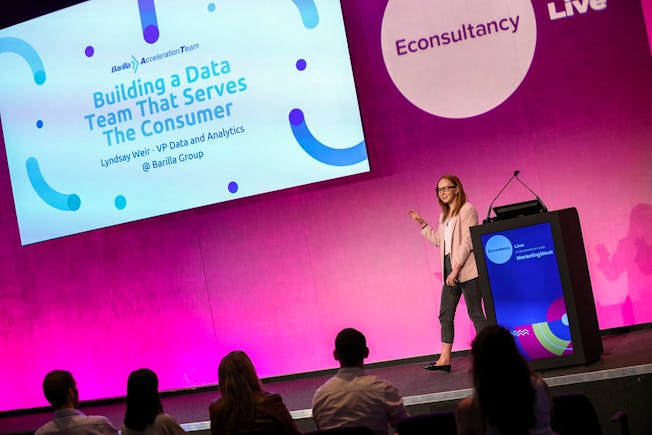
In advertising, and in enterprise extra typically, we regularly hear that decision-making must be “data-driven”.
Knowledge can yield every kind of essential insights into buyer behaviour and preferences, in addition to serving to to establish alternatives, potential challenges, and methods which are working successfully. Driving choices with information due to this fact appears like a strong manner to reach a world with extra information current than ever earlier than. Nonetheless, Lyndsay Weir, VP Knowledge and Superior Analytics at Italian family-owned meals firm Barilla, says that what your decision-making ought to actually be is people-driven.
“The information may also help gas it, however for me – sure, information can present choices, however we have to know why we’re doing that, and to form it and do it for the correct causes,” she instructed attendees at Econsultancy Dwell: CX 2022. “Inside Barilla, we’re after all going to be utilizing information to do that, however we must be extra people-driven, consumer-driven – as a result of on the finish of the day, we need to get extra folks to take pleasure in our sensible pasta!”
Weir emphasised the significance of approaching information with a transparent technique for achievement, and orienting information work round client needs. “Regardless that we’re a knowledge workforce, what we’re attempting to do is rework the way in which we talk with folks,” she defined. “It’s why every thing we do … is definitely pushed and enabled by what the buyer desires from us.”
Weir outlined three key parts of a people-driven strategy to information: use instances, high quality information, and know-how.
1) Use instances
“On the finish of the day, any work our information groups do inside Barilla – and any work your organisation must be doing with information – ought to come from the people who find themselves interacting together with your finish customers,” mentioned Weir. And each sort of information level – from web site guests to product purchases to occasion sign-ups – wants to start with a use case: a transparent view on how the enterprise goes to make use of the info you’re offering.
Weir beneficial mapping out potential use instances alongside the buyer journey from consciousness by means of to consideration, buy, service, and loyalty growth. For instance, a use case within the ‘consciousness’ stage could be bettering the buyer search expertise, utilizing analytics or pure language processing to grasp how shoppers are utilizing search and what they could be looking for. Within the ‘buy’ stage, digital shelf analytics may assist with product optimisation – pricing, promotions, or rankings – whereas client engagement scoring may enhance buyer loyalty within the ‘loyalty growth’ stage.
“There’s so many various methods you need to use information and analytics alongside the buyer journey,” Weir mentioned. “For me, it’s about the place you’re wanting to have interaction essentially the most on that client expertise and ensuring it aligns with what you’re attempting to ship.”
To that finish, Weir additionally suggested prioritising essentially the most precious use instances and information alternatives; whereas there could be a whole lot of doable alternatives to make use of information to optimise elements of the buyer journey, not all of them shall be worthwhile or actionable. She beneficial asking the next questions to find out worth:
- Can we do it?
- Do we have now the workforce to do it?
- Is it going to drive us achieve?
- Can we do it rapidly?
Barilla’s information workforce makes use of a proof of idea cycle to find out which answer is value placing its collective energies into. “We need to check it; we need to see if it really works; and as a world organisation, we have to pilot it with a sure market or area first, earlier than taking it out to that vast beast that may be a multinational CPG,” Weir defined.
The workforce adopts a ‘check and study’ and ‘it’s nice to fail’ mentality all through this course of. “We’ve received our use case; we all know what we’re attempting to check, and on the finish of the day, what we’re attempting to enhance for the buyer; after which we take that by means of an eight- to twelve-week cycle to carry it to life at small scale at first. If it really works, we are able to then scale that, embed it, and drive it throughout the enterprise.”
She additionally emphasised that funding is essential: in folks, in understanding, in instruments, in suggestions, and in high quality measurement. “It’s vital to get it proper each step of the way in which when you’re going to enhance your client journey.”
2) High quality information
Clearly, none of that is doable to do with out information; however many organisations, Weir mentioned, marvel how they’ll pay money for the info they want as a way to obtain what they need. Her recommendation was to “begin being sensible on the fundamentals”.
“Have a look at what you’ve already received, as an organisation, and take a look at how one can carry that into one place to democratise that information, clear it up, and permit folks to have entry to it, to begin asking, ‘So what?’”
Gaining access to high quality information additionally comes again, as soon as once more to placing the buyer entrance of thoughts: why ought to they offer you their information? “Lately, it’s actually uncommon for folks to need to give over their e-mail handle for no motive,” mentioned Weir.
“You’re going to need to be a privacy-first organisation; they should belief that the way in which you retailer [the data] is safe; and likewise, you want some good worth exchanges.”
Weir’s mantra round information is: “have much less, however do higher”. Many organisations attempt to intention for the “massive information” strategy, however with no clear use for the info, and with a lot of it being collected utilizing outdated strategies. Weir emphasised the significance of getting a centralised storage level, with a transparent technique to entry it, and no silos. Knowledge additionally wants clear foundations – resembling taxonomies, or a listing of information sources to simply establish what information you’ve and the place – to allow higher CX and progress.
“Do you’ve a knowledge catalogue to say, ‘We’ve received information on this client; it tells us these purchasing preferences, or these dietary necessities’? Have you learnt that about your enterprise so far? Would you already know what data you’ve received and what you need to use to drive a greater client journey?” requested Weir.
3) Expertise
“It’s actually paramount that if you wish to have a greater client expertise, if you wish to do information and analytics on the buyer, you’re going to want a chunk of know-how that brings all that client information collectively into one place, to that single client view,” mentioned Weir.
With out eager to delve too deeply into the professionals and cons of particular know-how platforms, Weir mentioned that discovering the correct piece of martech is about “understanding ‘What’s your use case? How do you need to speak to your client?’ And what are you able to carry collectively to get your outcomes?”
With regards to information instruments, it’s additionally vital to not get so hung up on issues like visualisations that you simply neglect about what Weir calls the “So what?”: understanding and performing on what the info reveals. Weir mirrored that a whole lot of corporations “can speak enterprise, however they’ll’t speak information – they usually don’t actually know the way to flip that information into actions”.
“It’s the most important pitfall with regards to taking [data] to the following degree: we spend a lot time on that visualisation, or the good dashboard or the good device – however so little time investing within the ‘So what?’ and the ‘What’s subsequent?’” she mentioned.
For Weir, three key issues are wanted to make this occur inside an organisation.
Capabilities and comms
“There’s a whole lot of alternatives for the buyer expertise if we’ve received the correct folks and functionality to unlock that inside our organisation,” mentioned Weir. She suggested taking a look at the place you need to be in 5 years’ time, then mapping the folks and the info abilities your organisation has at the moment, and utilizing this to construct a strong coaching plan and inner capabilities programme.
Weir additionally spoke concerning the significance of bringing everybody with you on the info journey by democratising entry to information and opening up instruments. “I had an incredible CMO in a earlier organisation who was hands-on working with me in Knowledge Studio dashboards to construct out studies he wished to see himself – as a result of he wished to know what to do and the way to unlock it,” she mentioned. “And I feel that’s actually essential.”
Bringing folks together with you on the journey additionally means sharing successes and proofs of idea throughout all ranges of the enterprise, creating issues like movies or one-pagers to assist folks perceive what’s being achieved, how, and why.
Altering mindsets and dealing
‘No extra silos’ is a purpose for nearly each organisation, however when constructing an organisational information tradition, Weir significantly emphasised the necessity to collaborate throughout groups and perceive what information would assist them to perform their targets. “We would outline what we’re engaged on, however we have to work with so many stakeholders on the similar time – as a result of on the finish of the day, we have to contain these individuals who communicate and contact with the shoppers each single day.
“Whether or not that’s our shopper advertising workforce; our gross sales workforce; our ecommerce leads – they’re those who ought to actually be telling us what to do, and we are able to then churn out the insights or fashions to make that occur.”
Equally, Weir defined that the info workforce ought to bridge between advertising and IT – “as a result of constructing that information tradition is about typically the technical, and typically the bringing it to life, and we wish to drive that collectively on the similar time.”
Embedding into the organisation (or: apply your information!)
For all that proofs of idea are helpful, Weir cautions towards getting so slowed down in a proof-of-concept cycle that you simply neglect to motion and scale the insights that work. “You’re by no means going to enhance one thing in your finish person if all you’re ever doing is small-scale test-and-learns,” she mentioned.
“After all, have a small portion of your enterprise all the time bringing within the new – however don’t ever neglect that the brand new you introduced in now has the potential to essentially change the way in which your organization operates for large quantities of individuals when you do it in the correct manner.”
She additionally suggested making use of the workflows and processes that exist already somewhat than attempting to invent new ones from scratch. “We like to take a look at what’s already there – whether or not it’s model planning cycles which have existed for years, or whether or not it’s a model constructing capabilities device. We need to match into that, however with information alongside the way in which – so we may also help folks learn to undertake it a bit higher.”
Lastly, having a longtime KPI (key efficiency indicator) framework is essential for measuring what you’re doing and getting suggestions from folks alongside the way in which. “In case you’re doing all of this, be sure you’re measuring what issues,” mentioned Weir. “Perceive what you’re driving in the direction of, and what’s your enterprise goal. [Everything] must be driving in the direction of this North Star metric – whether or not it’s enhance in gross sales, share of voice, or on the finish of the day, only a completely happy sentiment from the buyer.”

